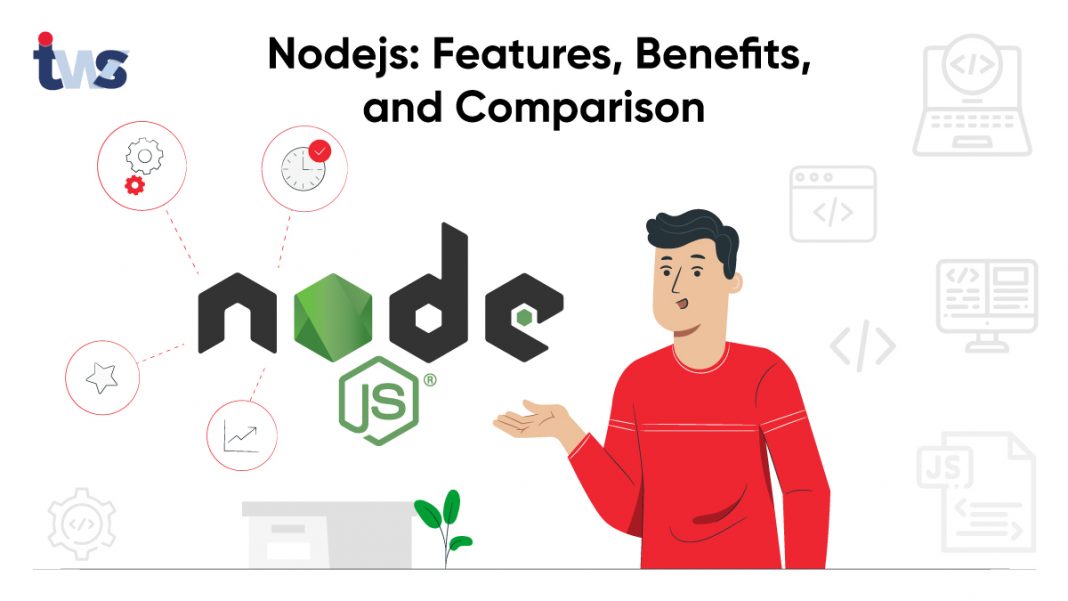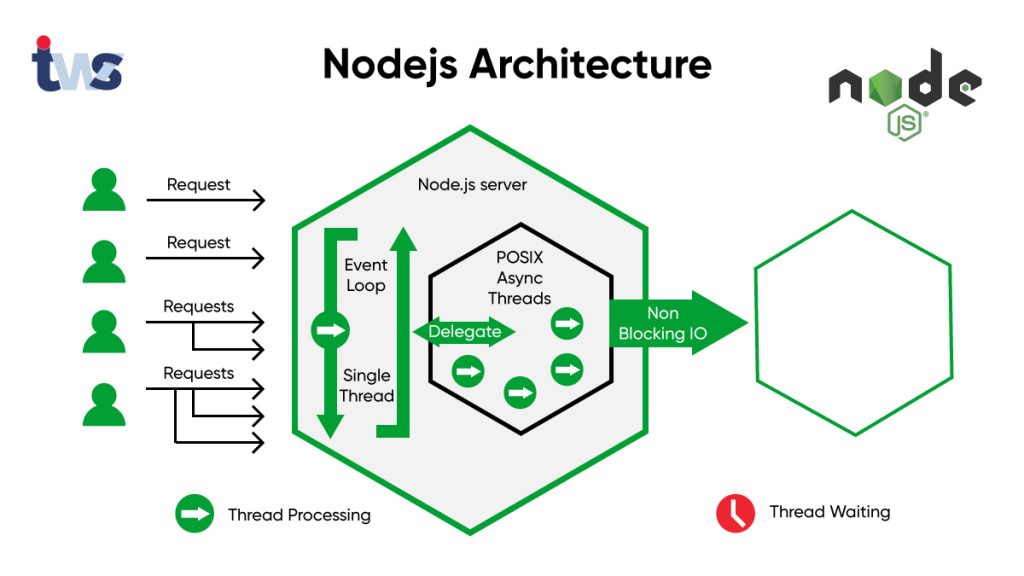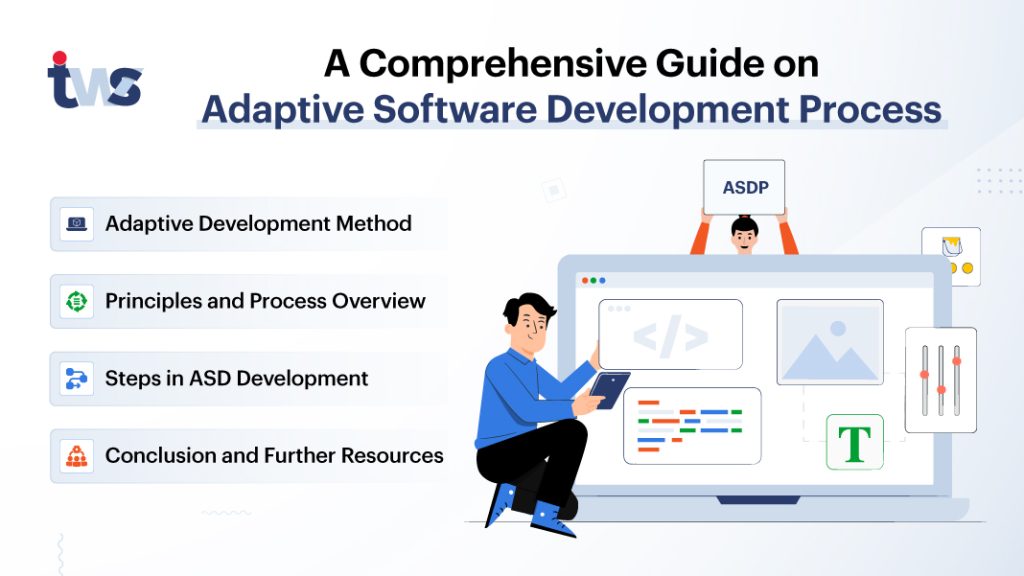
What is Node js? In recent years, Node JS has grabbed the attention of millions of developers due to the feature of using the javascript on both the server-side and client-side. Moreover, the giants’ websites like Walmart, Netflix, Mozilla, and Micro In recent years, Node js has grabbed the attention of millions of developers due to the feature of using the javascript on both the server-side and client-side. Moreover, the giants’ websites like Walmart, Netflix, Mozilla, and Microsoft using Node JS for a better user experience.
Table of Contents
Node JS: Overview
Node JS is an open-source server-side/client-side application framework to improve the overall performance. NodeJS is a single-threaded as well as an event-based process used for nodejs Development. Ryan Dahl develops Node JS in the year 2009 after the arrival of the first javascript-based environment.
What is Node JS?
What is Node js? Node JS is a platform based on Javascript runtime for developing easy and quick network applications. The smart use of Google’s V8 javascript search engine, event loop, non-blocking I/O model makes it lightweight and efficient.
Is Node js frontend or Backend?
Node JS is a runtime platform that allows the users to choose how to choose as it uses the same language for the backend and front end.
Is Node js a programming language?
Node js is not a programming language; in fact, it is a runtime environment. Node js uses the javascript for the frontend programming interface.
How Node js work?
In actual, Nodejs and javascript work on the V8 runtime environment where it converts the javascript files into the machine code. Tekki Web Solutions Inc. provides best Nodejs Development Services and on-time results.
What is the use of Nodejs?
Nodejs is commonly used for Backend Social Networking, SPAs, Chat Applications, Data Streaming, IoT Applications, etc. Fore more details about what is Node js used for you can read our detailed article.
Origin of Node JS:
Ryan Dahl developed this language as he wasn’t satisfied with the Apache Https server that works on the principle of handling the multiple threads. He was entirely frustrated with the method of the apache server; the way code is blocking the whole process.
Node JS Architecture:

The NodeJS architecture comprises an event-based, non-blocking I/O model. It makes the execution of the machine code quicker, which in turn makes the code execution faster. Moreover, the javascript and Nodejs code moves in the server-to-client direction that enhances performance ability.
- Single-Threaded: works on single thread avoid the context switching to improve the execution speed.
- Event Loop: Despite the Nodejs is single-threaded, but the event loop performs the non-blocking I/O operations.
- Non-blocking I/O: Works on the principle of a single thread, but uses the worker thread to execute the runtime tasks asynchronously.
- Front End Development: Front-end is a UI interface to handle the events and performs the data pulling from the back end server to the UI side.
- Back End Development: Back-end deals with the server-side scripting and database so that the front end can request it.
Features of NodeJS:
– Cross-Platform:
With the use of Node js, the developers in nodejs development company can create cross-platform web apps as it is compatible with desktop, mobile, and web development.
– Scalability:
Node js is highly scalable as it works on a set of microservices and modules. It does not require a large block for the development processes. Nodejs web development can be scaled both horizontally as well as vertically. Vertically, you can add resources to the node, and horizontally, you can add more nodes to it.
– Common Language for Frontend and Backend:
Nodejs provides the feature of using the same language for the frontend as well as backend development due to which saves the time and energy of the developers, results in more productivity and profitability.
– Performance:
Nodejs is one of the speediest frameworks as it runs on Google Chrome’s V8 javascript engine, which executes the javascript code into machine code very quickly. So, it boosts up the performance.
– Huge Community Support:
Node js is supported by the large community Github which makes it efficient enough to develop fast and support the framework. A large number of software developers and Nodejs users are contributing to support fellow developers or beginners.
Benefits of using Nodejs:
- Scalable for Modern Applications
- Cost-effective
- Easy to Learn for the Frontend and Backend developers
- Fantastic Performance
- Less Loading Time
- Cross-Platform Development
- Large Community Support
Drawbacks of using NodeJS:
- Unstable APIs
- Lack of Library Support
Comparison: Node js vs PHP
| NodeJS | PHP | |
| Process | Event-driven | Flow-driven |
| Scripting | Client-side/Server-side | Server-side scripting |
| Release Year | 2009 | 1994 |
| Developed by | Ryan Dahl | Rasmus Lerdorf |
| LTS | Yes | Yes |
| Open-source projects | 114,353 | 290,757 |
| Github users | 38,398 | 12,670 |
| Documentation | nodejs.org | php.net |
| CMS | Magento, WordPress, Opencart, Drupal, Joomla, PrestaShop | Apostrophe2, Ghost, KeystoneJS, enduro.js, Pencilblue |
| MVC frameworks | Symfony, Laravel, Yii, Codeigniter, Zend, Phalcon, CackePHP | Koa JS, Express JS, Sails JS |
On the Whole:
Node js used by almost 98% of 500 companies since it is very lightweight, quick, scalable, and capable of handling multiple events simultaneously. So, the list of Nodejs features is very long. To speed up the project and enhance performance, Nodejs web application development is beneficial for the startup and the enterprises.
Ran Into Node.Js Development Challenges?
Our Consultants are ready to help you select the right mix of technologies and tools for Node.Js development. Apply Node.Js best practices for development, assess and optimize application performance and reduce app maintenance costs.









 Business Number
Business Number